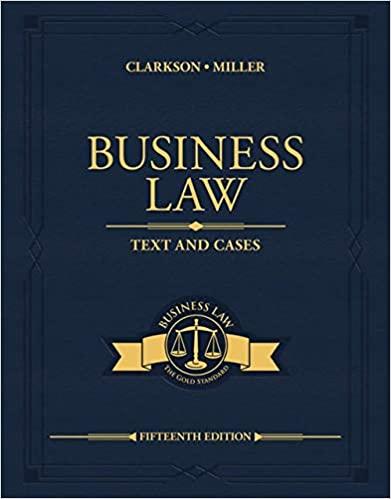Question
How would you respond to the following? (include questions for each response) Statement 1: Hi Destinee. Good work here, and thank you for your contributions
How would you respond to the following? (include questions for each response)
Statement 1: Hi Destinee. Good work here, and thank you for your contributions to this thread. In hospitality, affirmative action is a fairly controversial issue because there are obviously very large minority groups working in the service industry, in areas like hotel housekeeping and back-of-house support positions. Do you think this would be a valid context for affirmative action?
Statement 2:
I agree with you that what constitutes "reasonable" is sometimes open to discussion and interpretation. In my post, I noted that in addition to the federal codes and regulations, it is necessary in order to protect employee and employer rights to study case law. I don't think the laws go too far because there are a vast amount of situations that need to be covered in order not to discriminate or infringe upon the rights of the employers. It is certainly a delicate balance. I brought up in my article about "undue hardship" on an employer which was a standard elucidated in the Groff case.
I found a few interesting cases dealing with reasonable accommodation of an employee's religious beliefs. One deals with protecting the employer and patients. Robinson v Children's Hospital of Boston (2016), held that it constituted undue hardship to the hospital to accommodate an employee's refusal to take a flu vaccine for religious reasons. In another interesting case, Tiano v. Dillard Department Stores (1998), the central question revolved around whether a department store had engaged in religious discrimination when it refused to accommodate an employee's request for a leave of absence. The employee sought leave to travel to Yugoslavia for a religious pilgrimage, claiming she had received a divine "calling from God." However, the department store had a policy against granting a leave of absence during its busy season. While the store did offer the employee alternative leave options after the busy season, the employee insisted on leaving during this critical period and was subsequently terminated, as warned by the company. In its analysis of the case within the framework of Title VII's religious discrimination law, the court determined that the employee's insistence to take the leave, which involved the observation of religious artifacts in Yugoslavia during a specific time in October 1997, did not qualify as a religious calling. This conclusion was based on the absence of a satisfactory explanation for why her religious beliefs necessitated a trip during the employer's busy season.
Statement 3:
Great post for this week discussion. Reading your post, I was under the impression that I was reading mine. We have the same thought process. Anyways I completely agreed with your religious accommodation statement. Religious accommodation are rules to corporations and organizations to comply with the policy's enacted by the federal government and provide reasonable accommodation to employees to fulfill their religious obligations/preference based on their personal believe. Like you mentioned some people address that the current policy in place is not sufficient to employees, therefore this creates friction in any organization. In addition, the word reasonable is always miss interpreter or is a topic of discussion to try to understand it, or employees apply it the way they want to be used. This is the reason employer should be educated and aware of their rights and how this law is applicable. Did you think some employees take advantage or abuse of this policy for their benefit?
Step by Step Solution
There are 3 Steps involved in it
Step: 1

Get Instant Access to Expert-Tailored Solutions
See step-by-step solutions with expert insights and AI powered tools for academic success
Step: 2

Step: 3

Ace Your Homework with AI
Get the answers you need in no time with our AI-driven, step-by-step assistance
Get Started


